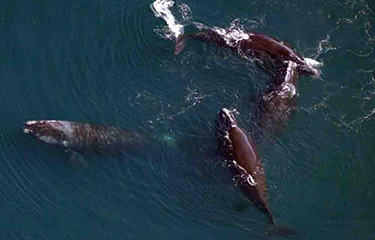NOAA has proposed new modifications to the Atlantic Large Whale Take Reduction Plan that are intended to address entanglements in fishing gear, one of the leading causes of death in the highly endangered animal.
The regulations are targeting pot and trap fisheries – specifically the Northeast Jonah crab and lobster fisheries – which according to NOAA Assistant Administrator for Fisheries Chris Oliver “deploy about 93 percent of the buoy lines fished in areas where right whales occur.” The plan would require gear modifications to reduce the number of vertical lines by requiring more traps on each line, in addition to the insertion of weaker parts of the rope; modify existing seasonal restrictions; add “up to two” new seasonal buoy line closures; and modify gear markings to include state-specific marking colors, along with increasing the number and area of marked lines.
“The proposed modifications would also allow fishermen to experiment with ropeless (buoyless) alternatives to accelerate research and development of ropeless fishing methods so that in the future, commercial fishing using ropeless technology can be used instead of seasonal closures to allow trap/pot fishing while protecting right whales,” Oliver said in an announcement addressing the new proposed regulations posted to the Federal Register.
The new regulations come in the wake of a federal court finding that the U.S. lobster fishery violates the Endangered Species Act, a ruling that subsequently lead to the Maine lobster fishery – by far the U.S.’s largest by volume and value – having its Marine Stewardship Council certification suspended. The court decided that lobstering in the state could continue, but warned federal regulators that they must meet a May 2021 deadline to create the new rules.
The latest modification to the take reduction plan – created by the 61-member Atlantic Large Whale Take Reduction Team, which includes scientists and industry representatives – is intended to meet that deadline.
“These proposed modifications will affect about 2,500 lobster trap/pot vessels that will have to make changes to the way they fish. The material and labor costs caused by the proposed rule in the first year are estimated to be USD 7 million to USD 15.4 million [EUR 5.7 million to EUR 12.5 million] spread out among the fishery that last year generated USD 485 million [EUR 394.3 million] in fishing revenue in Maine alone,” Oliver said. “As always, we are looking for ways to support fishermen as they transition to these new requirements, as our goal is to have both a thriving trap/pot fishery and a healthy population of right whales.”
Some environmental groups have criticized the new regulations, citing the fact the regulations use old estimates of the amount of whales remaining. Current estimates by scientists state that approximately 356 North Atlantic right whales remain.
“NOAA Fisheries' North Atlantic right whale numbers are significantly lower than the estimate on which the proposed rule is based,” Defenders of Wildlife Senior Attorney Jane Davenport said. “Unless NOAA Fisheries starts relying on up-to-date data, this rule will be far too little, far too late to prevent the species from going extinct within our lifetime."
The Conservation Law Foundation praised the progress, but also criticized the regulations as something that won’t be a long-term solution.
“After such an unprecedented delay, this new rule will help stem the surge of right whale deaths we’ve seen over the last several years,” CLF Senior Attorney Erica Fuller said in a release. “Ropeless fishing is the only solution that protects whales and fishermen, and the rule expands that practice. However, NOAA must end its reliance on weak rope as a solution and get emergency protections on the water immediately while this rule is finalized.”
The Maine Lobstermen's Association (MLA) welcomed the proposed modifications, and has begun the task of reviewing the proposals to advocate for the lobster industry.
"We have been anxiously awaiting the release of these draft whale rules since the summer," MLA Executive Director Patrice McCarron told SeafoodSource. "The MLA now begins the difficult work of reviewing this draft rule to ensure that the proposals will actually aid the recovery of right whales and that these rules do not risk the safety of our lobstermen at sea or the economic lifeline that the Maine lobster industry provides to our coastal communities."
Photo courtesy of NOAA







